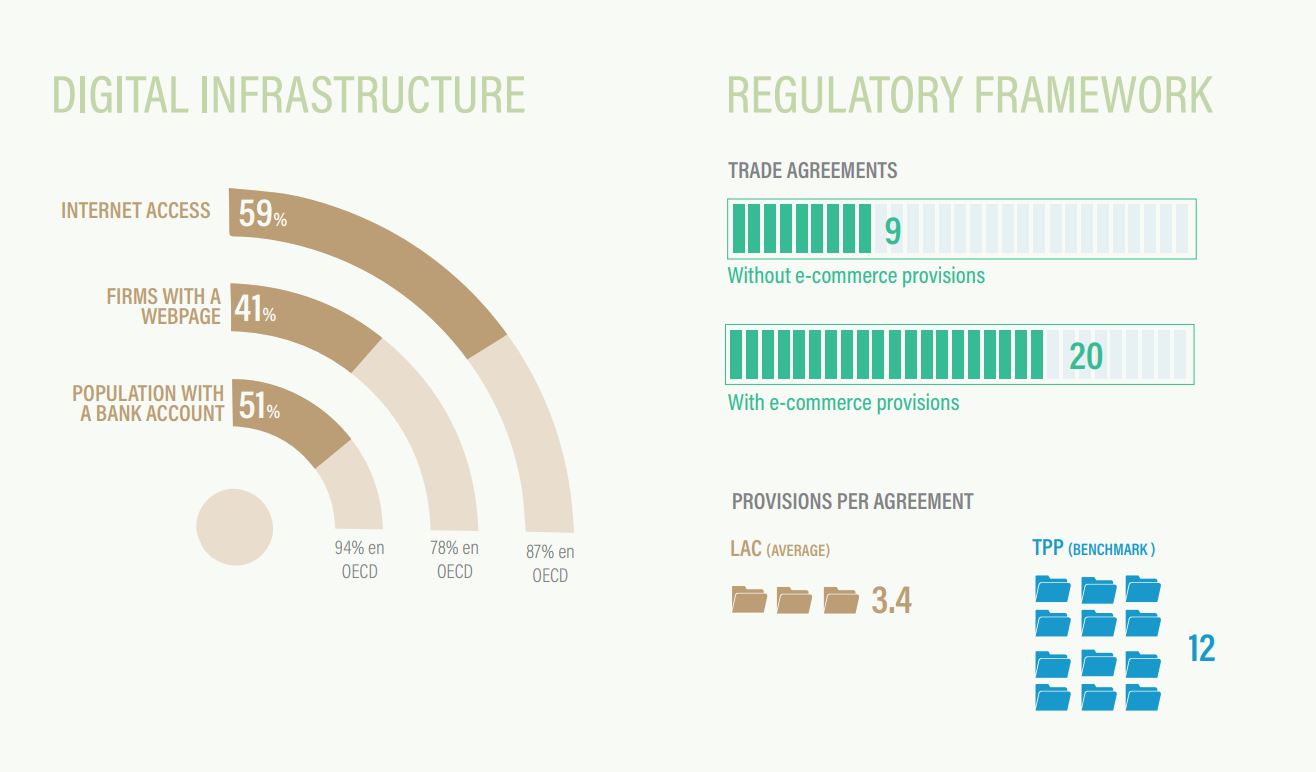Regulatory obstacles to cross-border e-commerce in Latin America and the Caribbean.
Latin America and the Caribbean (LAC) is home to 400 million internet users, meaning that 60% of its population has online access. In 2017, 140 million digital buyers living in the region spent an estimated US$60 billion in online retail. Most strikingly, LAC is the region with the highest percentage of consumers making online purchases exclusively abroad (15%), compared to 4% in Asia, with an additional 42% buying both domestic and internationally.
The figures seem to suggest that the region is an e-commerce powerhouse, with new technologies erasing borders and facilitating the flow of goods and services across countries. The reality, however, is more nuanced. As shown in the latest edition of the Trade and Integration Monitor, LAC’s participation in e-commerce remains marginal. The share of global business-to-consumer (B2C) spending controlled by the region hovers around 2%. In contrast, LAC accounts for 7% of global GDP and 6% of traditional global merchandise trade. In addition, only a few countries are actively participating in e-commerce, with the top three – Brazil, Mexico, and Argentina – accounting for close to 70% of all transactions by value. Finally, the bulk of electronic sales occurs domestically or extra-regionally, as barriers to intraregional e-commerce abound.
What are the obstacles?
Fostering e-commerce, particularly across borders, requires addressing both longstanding barriers to trade and emerging constraints that are specific to doing business online. Among the latter are the low quality and high cost of internet services, the limited availability of international electronic payment solutions, and the monetary and time costs imposed by transportation and customs procedures on high-volume and low-value items. In addition, the absence or heterogeneity of regulations does not give producers and consumers the necessary instruments, guarantees, and protection to engage in cross-border transactions, and puts LAC at a disadvantage compared to regions where greater legal harmonization has been achieved.
What are LAC countries doing?
International trade, whether conducted via traditional or digital means, is subject to the multilateral rules established under the auspices of the World Trade Organization (WTO). Yet, the extent to which these rules apply to digitally-mediated trade is not always clear, and multilateral negotiations to clarify the application and close loopholes have been moving at a very slow pace. These factors have led countries to include e-commerce provisions in preferential trade agreements (PTAs), so as to establish a level playing field among partners.
The Trans-Pacific Partnership (TPP) is potentially the trade agreement with the broadest range of e-commerce provisions, making it useful as a benchmark for regional efforts at regulatory upgrading and harmonization. The analysis contained in the Trade and Integration Monitor reveals that nearly 70% of the surveyed PTAs subscribed by LAC countries contain at least one provision on e-commerce, with 52% containing a separate e-commerce chapter. The apparent widespread presence of e-commerce provisions notwithstanding, LAC PTAs contain on average less than a third of those included in the TPP – 3.4 provisions per agreement compared to the substantive 12 of the TPP.

The disparity between LAC’s regulatory framework on e-commerce and the global benchmark is even more evident if measured in terms of the gap between potential and actual bilateral commitments. Actual regional commitments on e-commerce correspond to only 13% of potential ones. The most frequent type of commitment refers to e-commerce facilitation, which includes measures that are not exclusive to online trade, such as the automation of customs procedures. Meanwhile, very few negotiations have addressed e-commerce-specific topics, and the few that have done so contain much lighter obligations that those in the TPP.
What is the way forward?
While LAC countries still struggle to address longstanding obstacles to trade, new challenges emerge with innovative forms of doing business. The analysis of PTA provisions in the Trade and Integration Monitor shows that LAC is lagging in terms of establishing a supportive and homogeneous regulatory framework for e-commerce. It is thus necessary to adapt the region’s network of trade agreements to the realities of the digital age and ensure that rules and regulations are harmonized across the region so we can e-buy from our neighbors more easily.


Leave a Reply